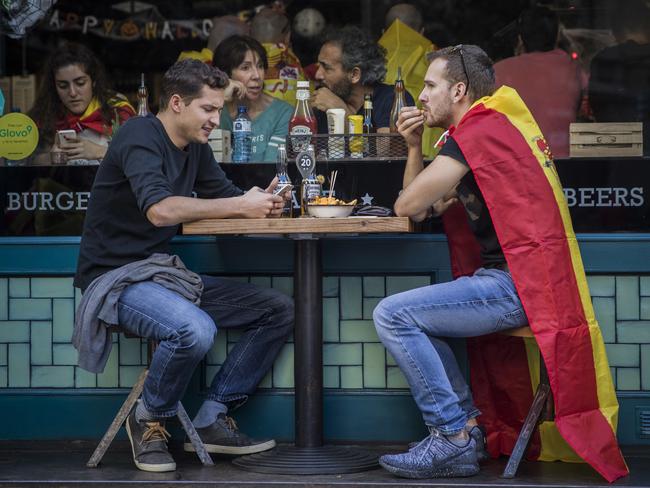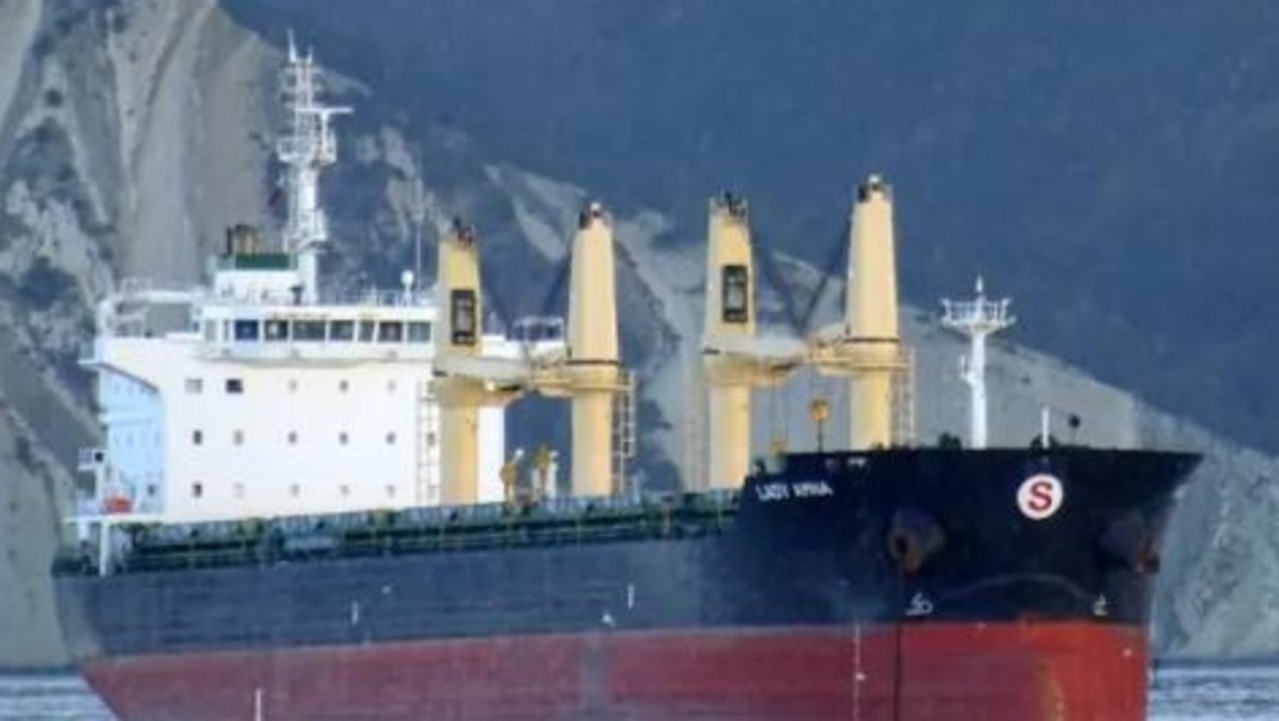Why the Catalonia region in Spain wants independence
THE calls for Catalonia’s independence from Spain continue to grow louder. But this map proves it may be hard to achieve.
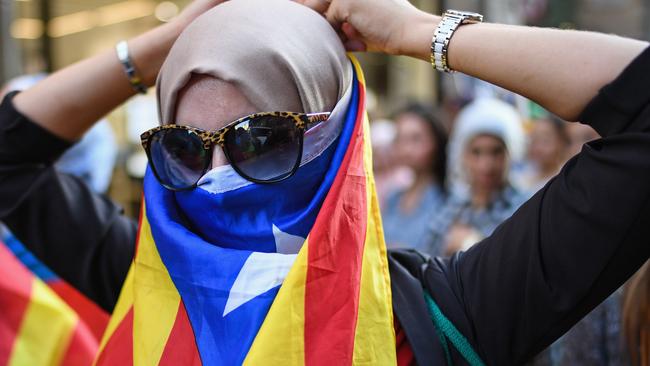
IF YOU ask a Catalan resident why they are seeking independence from Spain you may be surprised at the answer.
“I’ve never felt Spanish in my life,” graphic designer Anna Faure told AP on the weekend as the region battles to declare independence from Spain.
The Catalonia region has made headlines around the world as its bid for independence is threatening to tear Spain in two.
Faure is a resident of Girona, the home town of ousted Catalan President Carles Puigdemont, which lies about 100km northeast of the Catalan region’s capital of Barcelona.
Many people in this north eastern region of 7.5 million believe Catalonia’s language, history and cultural traditions — even Catalans’ ironic sense of humour — set it apart from the rest of Spain.
If you walk the streets of Girona, you’ll find its narrow medieval streets festooned in the colours of the independence movement’s red, yellow and blue Estelada flag.
The city hall flies Catalan and EU flags — the Spanish one has been removed.
On Saturday, Puigdemont was cheered by crowds shouting “President!” and “Long live the republic!” as he walked through the city.
Over the weekend Girona celebrated the annual festival of its patron saint with food, music, a carnival and displays of the gravity-defying sport of human towers, known as castells.
Faure says castells is a true Catalan tradition, a view she doesn’t hold about Spanish icons such as bullfighting, which Catalan authorities have tried to ban, or Flamenco, an import from Andalusia in southern Spain.
Flamenco is fine, she said, but “it’s not mine.”
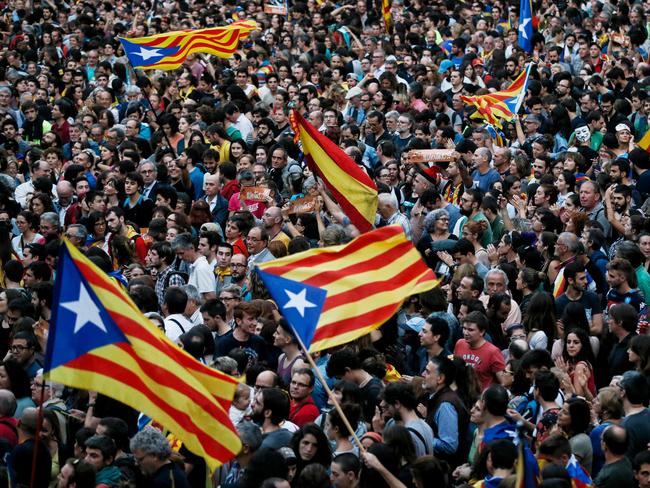
That feeling of separateness has mixed with a volatile blend of wounded pride, economic pain and political animosity to create a crisis that could break up Spain.
The country has been in constitutional turmoil since Catalans backed independence in an October 1 referendum that was dismissed as illegal by Spain.
When the regional parliament voted on Friday to declare independence, Madrid fired the Catalan government and called a new election.
But so far, Catalan’s former leader has insinuated that he won’t step down.
No one knows how the crisis will end, but many Catalans feel it has been a long time coming.
This is what’s going on.
‘WE HAVEN’T BEEN TREATED WELL’
“We wouldn’t have arrived at this point if they had treated us well for many years,” said illustrator Judit Alguero, expressing a common feeling that the authorities in Madrid were at best neglectful and at worst hostile to Catalan aspirations.
The seeds of that feeling, and of Catalonia’s modern independence movement, germinated during the authoritarian regime of Francisco Franco between 1939 and 1975.
Franco banned the official use of the Catalan language and executed or imprisoned opposition politicians and activists.
Stories of that repressive era are part of the lore of many Catalan families.
Primary schoolteacher Ariadna Piferrer, whose grandmother told of being beaten for speaking Catalan at school, said that by declaring independence “we are living the dream of our grandparents. And I think that’s so important for us.”
After Franco’s death, Spain became a democracy, and Catalonia was granted a degree of autonomy, with a regional government, its own police force and control over education. Public schools now teach primarily in Catalan, and national symbols are flown with pride.
While Catalan nationalism has flourished, support for outright independence was not widespread in the decades after Franco’s death.
In the early 2000s, polls suggested only about 15 per cent of Catalans wanted to break from Spain. But in recent years, economic crisis and political hostility between Barcelona and Madrid have left many Catalans feeling wounded, fanning the flames of separatism.
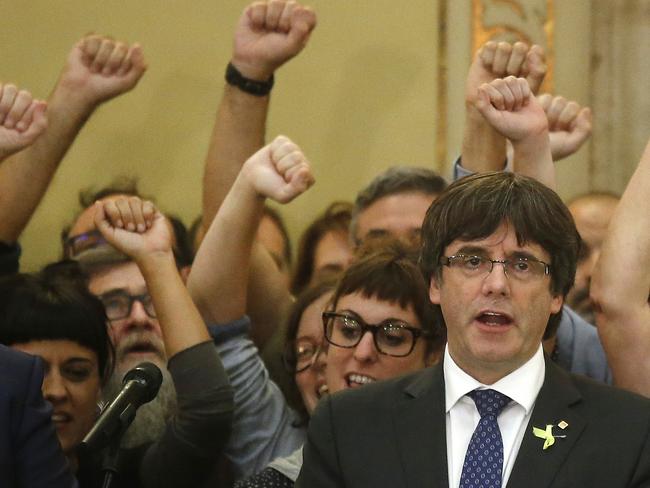
Many here trace their support for independence to the political and legal battle over a 2006 autonomy agreement granting Catalonia the status of a nation within Spain, with tax raising powers.
Parts of the agreement were struck down by Spain’s constitutional court in 2010, triggering angry protests and leading some Catalans to believe they would never get a fair deal from Spain. That sense of grievance grew stronger after the 2008 global financial crisis hammered Spain, spending unemployment skyrocketing.
Catalonia is one of the country’s wealthiest regions, and many here feel they pay more into Spanish coffers than they get back.
Andrew Dowling, a specialist in Catalan history at Cardiff University in Wales, said that 13,000 businesses in Catalonia went under in 2009, pushing many moderate Catalan nationalists toward independence.
“The financial crisis made Catalans angry, that as a rich area they were suffering because they had no control over the economic levers,” Dowling said.
‘A MASSIVE STRATEGIC ERROR’
Against that backdrop, Catalonia’s independence movement has excelled at harnessing discontent toward Spain’s capital Madrid.
A pro-independence coalition was elected in 2015 on a promise to push for succession, and well-organised groups have brought hundreds of thousands of protesters into the streets.
The movement culminated in an October 1 referendum that backed calls for independence but turnout was only 43 per cent as many pro-union voters stayed away and Spain sent in police to shut down polling stations.
In some areas, police clashed with independence supporters and removed voters with force, violence that pushed some previously undecided voters into the pro-independence camp.
Two leaders of the independence movement have been jailed on charges of sedition, to the fury of many Catalans.
For independence supporters, it’s evidence that Spanish Prime Minister Mariano Rajoy’s conservative government had not yet shed Franco-era authoritarian urges.
Dowling said “the Spanish government had a notion that Catalan nationalism was like a souffle” that would collapse with investment and economic growth. He said that assumption led Rajoy into “a massive strategic error,” and the harsh reaction from Madrid had only hardened the determination of Catalan separatists.
Friday’s vote by Catalonia’s parliament to declare independence raised the stakes further. Spain responded by dismissing the Catalan government, taking direct control and calling a regional election for December 21.
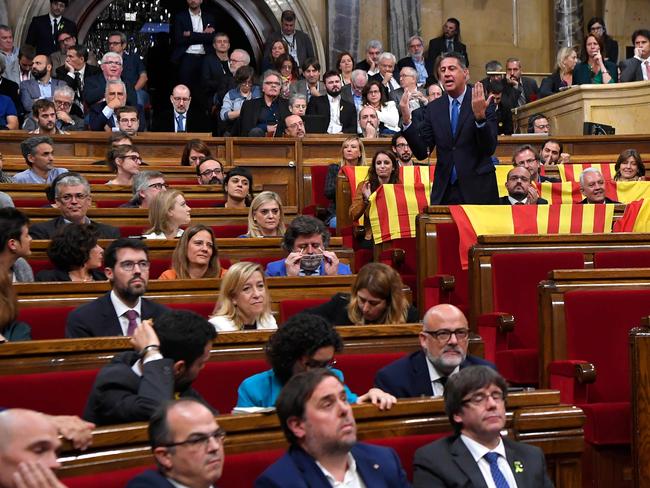
Others have pointed out Catalonia won’t ever get rid of Spain, with a map showing the outline of the Iberian Peninsula is mimicked in the streets of one Catalonian city Badia del Valles northwest of Barcelona.
The streets and avenues align with the shores and borders of Spain.
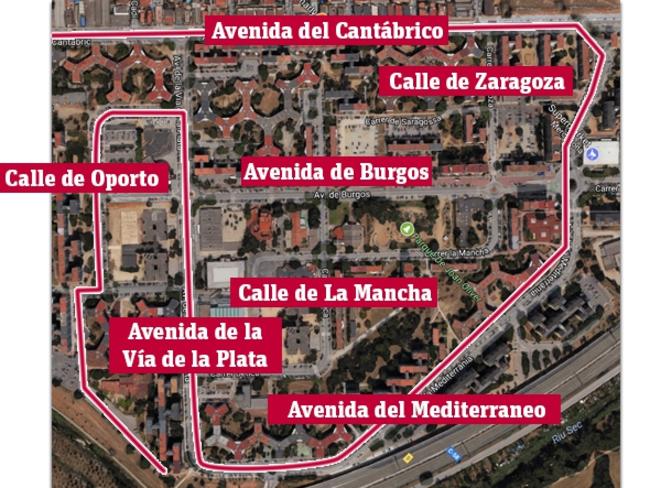
WHERE WILL IT END?
No country has recognised Catalonia’s independence, and European nations, the European Union and the United States have all have strongly backed the Spanish government.
The tide also seems to be turning against the pro-independence movement in Spain.
On Sunday, hundreds of thousands of Catalans took to the streets of Barcelona to voice their opposition to the region’s declaration of independence.
Waving Spanish, Catalan and European Union flags, the protesters described themselves as the silent majority who have been ignored during the wealthy region’s bid for independence.
“We have organised ourselves late, but we are here to show that there is a majority of Catalans that are no longer silent and that no longer want to be silenced,” said Alex Ramos, head of Catalan Civil Society, a pro-union grassroots group.
The organisers said more than one million people turned out but police put the figure at 300,000. There was no way to immediately reconcile the figures. The mood at Sunday’s rally was festive. “We won’t let Spain be torn apart into pieces,” read one banner. “The awakening of a silenced nation,” read another.
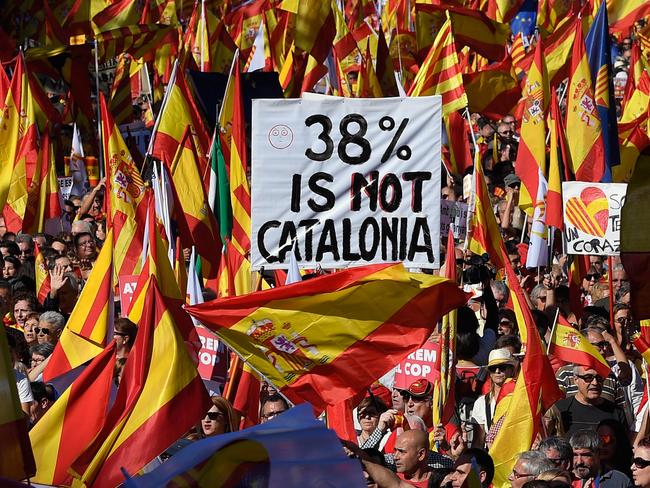
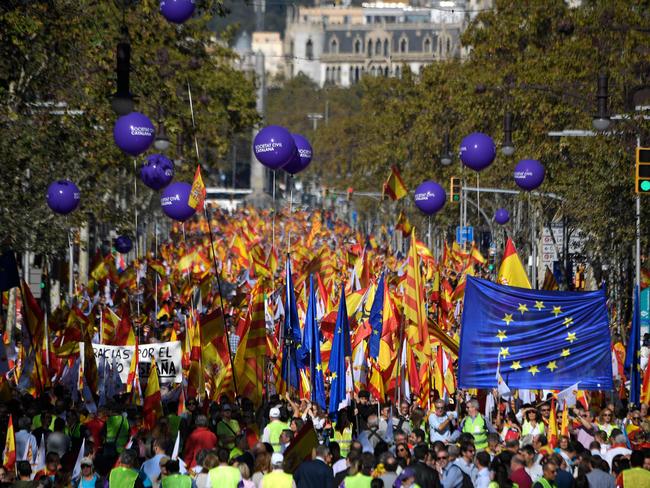
Monday will be the first working day since the region declared independence and its leadership was fired. It was not known how Catalonia’s estimated 200,000 public workers will react to their bosses’ dismissal.
Ousted regional leader Carles Puigdemont has called for Catalans to engage in peaceful opposition to Spain’s takeover of regional affairs, saying he and his fired cabinet would keep “working to build a free country”.
Separatist parties and grassroots groups have spoken of waging a campaign of disobedience to disrupt efforts by central authorities to run the region.
Spain’s government has said the ousted Catalan leaders could be charged with usurping others’ functions if they refused to leave. Spanish prosecutors have also said they may consider rebellion charges against leading separatists.
There are fears the political turmoil in Catalonia could have a severe economic impact, both in the region and on Spain itself.
Some 1700 businesses have already moved their official headquarters out of Catalonia because of the uncertainty.
“Our society is fractured, there are family members and friends who no longer can talk about politics to avoid conflict,” said Angelita Cuesta, a 66-year-old retiree at the anti-independence rally.
But independence supporters insist they want dialogue, and many believe there will be more strikes and demonstrations if Madrid does not listen.
“We are willing to take this to the limit,” said Joan Montardit, a 65-year-old photographer in Barcelona.
“They have to finally understand that they need to respect our way of being, our language, the way we are.
“There are two alternatives: dialogue or truncheons,” he said. “Let’s see what happens.”
